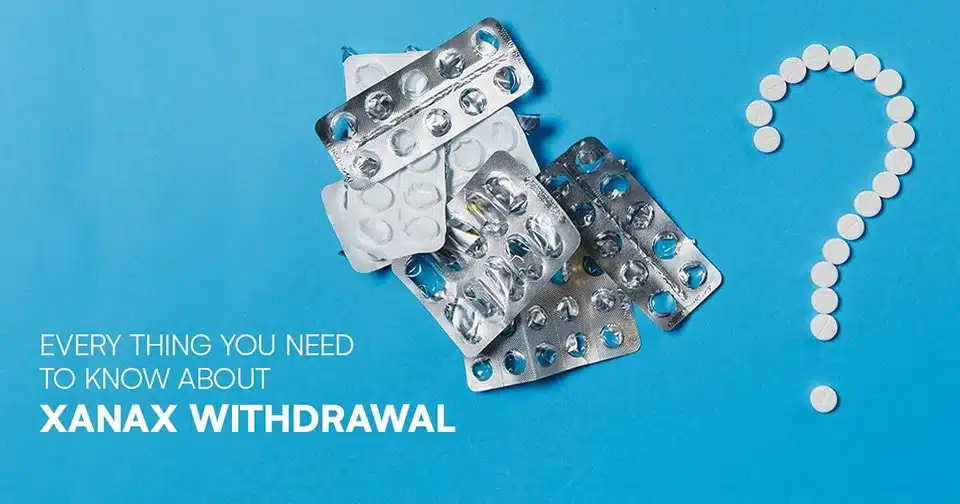Xanax withdrawal, the first step of long-term addiction treatment, can be challenging. However, with proper care, you can make it safe and manageable.
What is Xanax?
Xanax is a brand of an anti-anxiety drug called alprazolam used to treat anxiety disorders and anxiety associated with depression. Alprazolam is a member of a group of medications known as benzodiazepines (benzos) that are available with a doctor’s prescription.
The Drug Enforcement Administration (DEA) has categorized this drug as a Schedule IV substance because of its high drug abuse potential. Other benzos in Schedule IV include:
- Clonazepam (Klonopin)
- Diazepam (Valium)
- Lorazepam (Ativan)
Top 5 Fast Facts on Xanax (Alprazolam) Use and Misuse
- Alprazolam is the most frequently prescribed medication in the United States; it is also the most commonly prescribed medication for mental illness.
- Doctors dispensed over 48 million alprazolam prescriptions in 2013.
- It is the second most common prescription drug involved in misuse-related ED visits.
- Among all benzodiazepine overdoses, alprazolam overdose is the most toxic.
- People with a history of alcohol or narcotic use prefer alprazolam to other benzos.
Xanax Effects and Side Effects
Recreational users report Xanax’s effects as sedating or calming. Unlike stimulants, such as cocaine, the drug does not produce euphoric feelings (high). Instead, it causes the user to feel relaxed, quiet, and exhausted. Some users report falling asleep, losing memory, and blacking out.
Side Effects
- Drowsiness
- Tiredness
- Dizziness
- Sleep problems
- Memory loss
- Poor balance
- Slurred speech
- Trouble concentrating
- Irritability
- Diarrhea/constipation
- Excessive sweating
- Headache
- Nausea/vomiting
- Upset stomach
- Blurry vision
- Appetite or weight changes
- Swelling of hands or feet
- Muscle weakness
- Dry mouth
- Stuffy nose
- Decreased sex drive
What is Xanax Withdrawal?
Withdrawal is a group of symptoms that appear when you stop Xanax use cold turkey or take lower doses; withdrawal can be potentially fatal if you develop seizures. Seizures are most likely to occur when you:
- Stop use suddenly (especially after long-term use)
- Decrease the dose rapidly
Xanax Withdrawal vs. Detox
Many people use these terms interchangeably. Yet, there is a subtle difference between these two terms.
Unlike withdrawal, which refers to uncomfortable symptoms, a detox is a treatment approach. Detox from Xanax aims to eliminate the drug from the nervous system as safely and rapidly as possible. The elimination method may vary according to the severity of abuse and substance use disorder.
Generally, the higher the severity means you should remove the drug gradually under medical supervision. Medical advice says self-detox is not recommended for benzodiazepine withdrawal. Notably, there have been a few case reports of death during withdrawal.
Symptoms of Xanax Withdrawal
Xanax withdrawal typically occurs in three phases. Yet, the severity and timeline of the symptoms may vary.
Immediate Withdrawal
Also called rebound symptoms, the early symptoms occur 24 hours to 4 days after last use. They mimic the symptoms of the condition you were addicted to Xanax for. The rebound symptoms can be worse than the original ones. Most importantly, short-acting seizure risk is highest during this phase.
Symptom during early withdrawal can include:
- Sleep problems
- Nausea
- Vomiting
- Diarrhea
- Headache
- Anxiety
Your doctor will probably ask you to lower the dose or give another drug to relieve rebound symptoms.
Acute Withdrawal
Acute withdrawal usually begins on the fifth day following cessation and can last up to 28 days. Rarely, some people may experience acute withdrawal symptoms for several months. Users who have undergone detox describe this phase as the most uncomfortable. Symptoms are intense and can include:
- Jitteriness
- Nightmares
- Sleep disturbances
- Anxiety and panic attacks
- Changes in visual perception
- Experiencing things that are not there (hallucinations)
- Obsessive thoughts
- Paranoia
- Severe depression
- Aggression
- Strong cravings
- Pain throughout the body
- Weakness
- Abdominal cramps
- Dizziness
- Double or blurry vision
- Ringing in the ears
- Flushing
- Unsteadiness
- Seizures
Protracted Withdrawal
Most withdrawal symptoms no longer persist after the acute withdrawal phase. The remaining constitute post-acute or protracted withdrawal. Studies show that 10–25 percent of heavy users experience withdrawal for a year or longer.
Protracted withdrawal symptoms can include:
- Insomnia
- Anxiety
- Poor concentration
- Decreased or no sex drive
- Depression
- Mood swings
Some people may find these symptoms affecting their quality of life. Psychotherapy (talk therapy) and certain drugs can help relieve the symptoms.
Complications of Xanax Withdrawal
Though withdrawal is rarely fatal, it can cause severe complications, such as:
- Hallucinations
- High blood pressure
- Bizarre behaviors
- Shaking
- Elevated body temperature
- Seizures
- Excessive sleepiness
- Coma

Treatment
A trained health professional should supervise detox to help monitor and treat the symptoms. The treatment options can include:
Medically Assisted Detoxification
Also called medical detox, it is the first step of treatment. During detox, you will take lower doses increasingly under medical supervision. This is known as dose tapering. The rate and duration of dose reduction depend on how long you have abused the drug. Abruptly stopping Xanax can be harmful or even fatal. Thus, you should gradually reduce the dose as recommended by your doctor.
Dose tapering helps make withdrawal symptoms easier to manage. Moreover, medical supervision allows your doctor to respond rapidly if you have any side effects and withdrawal symptoms.
Detox itself is not enough to treat addiction, though it can safely manage acute physical withdrawal symptoms. Besides, it prepares you for effective long-term addiction treatment.
Medications
Your doctor may give you certain medicines if you experience severe withdrawal. The choice of the medication depends on your individual needs and the type and severity of the symptoms.
Medications help relieve specific symptoms, such as mood swings, depression, cravings, and anxiety. Besides, you may use certain non-prescription (OTC) medicines to treat nausea, vomiting, and diarrhea.
Antidepressants. The two most widely used antidepressants during withdrawal are fluoxetine (Prozac) and paroxetine (Paxil).
Anti-anxiety Medications. Buspirone is commonly used to treat anxiety, stress, and nervousness.
Clonazepam (Klonopin). It helps reduce rebound anxiety and may be used when tapering benzos.
Carbamazepine (Tegretol). It is an anticonvulsant that improves sleep problems, anxiety, and mood swings.
Gabapentin (Gabapentin). Doctors may use it to reduce cravings.
Getting Help
Counseling and cognitive-behavioral therapy (CBT) may help some users manage symptoms without relying on other drugs. Managing symptoms is key to preventing relapse.
CBT is used during the post-acute withdrawal phase to control persistent psychological problems associated with substance abuse. A CBT therapist helps you identify problematic thoughts and triggers. Then, they will teach coping strategies and self-monitoring techniques.
Other therapies can include cue exposure, individual or family counseling, and support groups.
Xanax withdrawal can be life-threatening and uncomfortable. However, help from the right treatment facility can give you the best chance at being successful going into long-term sobriety. Opus Health has the team and infrastructure to assist with any step of the addiction cycle; call 855-953-1345 to learn more.




